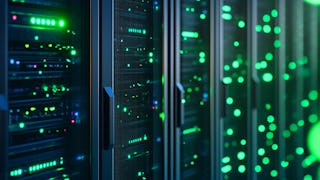This course covers current and evolving data network technologies, protocols, network components, and the networks that use them, focusing on communication to and from the Internet and Local area networks. Course content includes Internet architecture, organization, and protocols including Ethernet, 802.11, routing, switching, OSI and TCP models, DNS, SNMP, DHCP, and more. Students will be presented with Internet-specific networking tools for searching, testing, debugging, and configuring networks and network-connected host computers. At the graduate level, students will be given real world examples, with best practice and business use cases as related to the content on hand, as well as threats and mitigation steps.

Enjoy unlimited growth with a year of Coursera Plus for $199 (regularly $399). Save now.

Introduction to Data Networks and the Internet - Bachelor's

Instructor: Philip Matuszak
1,545 already enrolled
Included with
(26 reviews)
Recommended experience
Skills you'll gain
Details to know

Add to your LinkedIn profile
17 assignments
See how employees at top companies are mastering in-demand skills

There are 9 modules in this course
Welcome to Introduction to Data Networks and the Internet! In this course, we will cover the topics of: Introduction to Network Concepts; OSI, TCP, and Network Addressing; Network Installation and Configuration; Network Management; Network Security Concepts; Network Analysis; Network Troubleshooting; Software Defined Networks and the Cloud. In the ever-evolving landscape of technology, computer networks have become the backbone of modern communication and information exchange. Understanding the fundamentals of networking is essential for anyone seeking to navigate the digital world effectively. In this introduction, we will explore their interplay in creating robust, efficient, and reliable networks that underpin our interconnected world.
What's included
5 videos5 readings3 assignments1 discussion prompt
In the vast realm of computer networking, understanding the fundamental principles and models is paramount for anyone delving into the world of data transmission and communication. In this module, we will embark on a journey to unravel the intricacies of networking through the lens of two crucial models: the OSI (Open Systems Interconnection) model and the TCP (Transmission Control Protocol) model. These models serve as the backbone for comprehending the architecture and functioning of modern computer networks. Additionally, this module is designed to equip you with a foundational understanding of networking models, switching, and routing. These concepts are indispensable for anyone aspiring to navigate the intricate world of computer networks and contribute to the seamless flow of data in our interconnected digital age.
What's included
4 videos2 readings2 assignments
The establishment and maintenance of robust and efficient networks are fundamental to the success of organizations and businesses. To embark on this journey, it is essential to first understand the foundational aspects of network installation and configuration. This introduction serves as a gateway to explore the objectives outlined in module 3, which encompass the essential elements of network setup and management. Whether you are a seasoned IT professional or a newcomer to the world of networking, this module will serve as a valuable resource to enhance your skills and knowledge in this dynamic field.
What's included
5 videos3 readings2 assignments
In this module, we will embark on a journey to explore fundamental concepts and practices that are integral to effective network management. It will provide you with an overview of the key concepts and principles that form the foundation of network management, setting the stage for your journey into this dynamic field.
What's included
3 videos2 readings2 assignments
Throughout this module, we will equip you with the knowledge and insights necessary to build a solid foundation in network security. By the end, you will be better prepared to navigate the complex world of networked systems security and protect the digital assets entrusted to you.
What's included
4 videos2 readings2 assignments
The importance of effectively monitoring network traffic cannot be overstated. It serves as the foundation for robust cybersecurity practices, network performance optimization, and troubleshooting. By the end of this module, you will have gained valuable insights into the 'what' and 'why' of network traffic monitoring, as well as a practical understanding of how to capture and log network traffic effectively, utilizing a diverse range of tools and formats. These insights will be instrumental in ensuring the security and efficiency of your network infrastructure.
What's included
3 videos2 readings2 assignments
In today's interconnected world, computer networks serve as the backbone of modern communication and information exchange. Whether in the context of a home network or a vast corporate infrastructure, maintaining the functionality and reliability of these networks is of paramount importance. However, as with any complex system, network issues can arise, disrupting connectivity and productivity. To effectively address these challenges, network professionals must possess a fundamental understanding of troubleshooting methodologies, diagnostic tools, and common causes of network-related issues. This module serves as a gateway to explore these essential aspects of network troubleshooting and problem-solving.
What's included
3 videos2 readings2 assignments
The realm of networking has witnessed a transformative revolution. As organizations seek more agile, flexible, and scalable networking solutions to meet their ever-growing demands, concepts such as Software-Defined Networking (SDN), the integration of networking in cloud-based solutions, and the emergence of virtual networking devices have come to the forefront. In this module, we will gain a deeper understanding of the dynamic and ever-evolving landscape of networking, offering insights into how these concepts are shaping the future of connectivity and information exchange in our increasingly interconnected world. So, let's explore where the virtual meets the physical, and traditional networking gives way to the innovation and flexibility of the digital age.
What's included
3 videos2 readings1 assignment
What's included
1 assignment
Build toward a degree
This course is part of the following degree program(s) offered by Illinois Tech. If you are admitted and enroll, your completed coursework may count toward your degree learning and your progress can transfer with you.¹
Instructor

Offered by
Explore more from Networking
 Status: Free Trial
Status: Free Trial Status: Free Trial
Status: Free Trial Status: Preview
Status: Preview Status: Free Trial
Status: Free Trial
Why people choose Coursera for their career




Frequently asked questions
To access the course materials, assignments and to earn a Certificate, you will need to purchase the Certificate experience when you enroll in a course. You can try a Free Trial instead, or apply for Financial Aid. The course may offer 'Full Course, No Certificate' instead. This option lets you see all course materials, submit required assessments, and get a final grade. This also means that you will not be able to purchase a Certificate experience.
When you purchase a Certificate you get access to all course materials, including graded assignments. Upon completing the course, your electronic Certificate will be added to your Accomplishments page - from there, you can print your Certificate or add it to your LinkedIn profile.
Yes. In select learning programs, you can apply for financial aid or a scholarship if you can’t afford the enrollment fee. If fin aid or scholarship is available for your learning program selection, you’ll find a link to apply on the description page.
More questions
Financial aid available,





